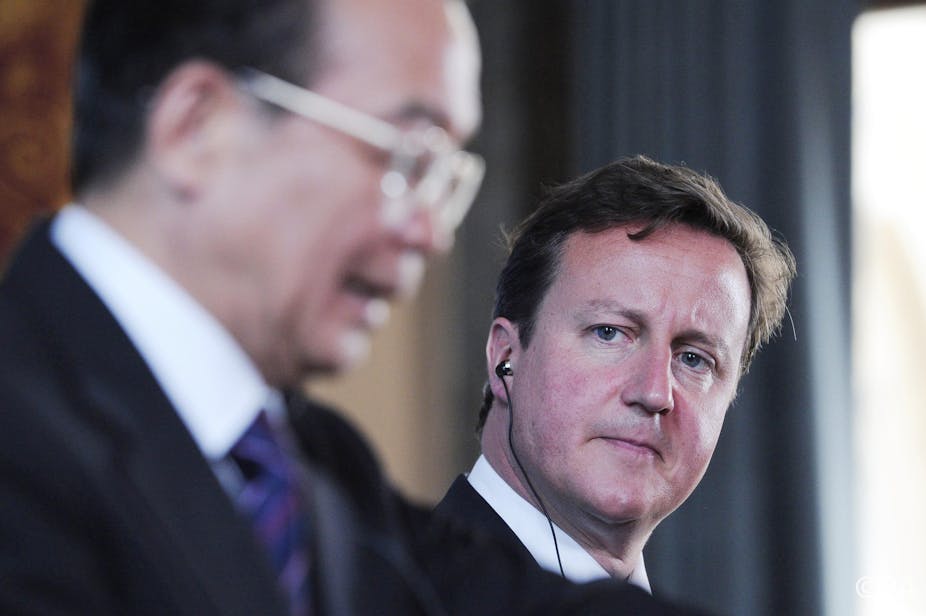Recent news that David Cameron has been placed on the naughty step by China after his meeting with the Dalai Lama caused much concern in UK business circles.
Reports suggested the Chinese sovereign wealth fund, China Investment Corporation (CIC), is reconsidering its investment strategy in the UK. Projects such as the High Speed 2 rail network and Britain’s nuclear programme could be at risk.
Should we be concerned? Some think it could harm the UK’s economic recovery, given that the CIC holds assets worldwide of $482 billion (£311 billion) and that the Corporation’s pique might go on to infect commercial Chinese firms, which invest around $70 billion (£45 billion) annually around the world.
But, despite this conventional wisdom, Chinese investment is not critical to the UK.
China’s total investment in the UK reached £28.8 billion in 2010, according to government department UK Trade and Investment (UKTI). This is a respectable figure, but it only accounts for 0.28% of foreign assets in the UK.
And only a minuscule part of this – £0.4 billion – was actually foreign direct investment (FDI); that is the commercial investment the UK craves. By the end of 2011, this stock of Chinese FDI had doubled to £0.8 billion. But even so, in 2011 Chinese commercial enterprises had invested less in the UK than South African (£1.1 billion) or Indian (£2.8 billion) firms did.
What’s more, the four-fold increase in China’s direct investment stock in the UK between 2007 and 2011 was outpaced by Greece’s comparable investments, which rose from £0.2 billion to £1 billion over the same period – though that was likely driven by a different strategic intent.
Yet these bare figures do not indicate the UK does not benefit from Chinese investments – simply that the scale must be kept in perspective.
Chinese businesses, such as Bosideng, Bright Food, Huawei, NVC Lightning or Shanghai Automobile and Industrial Corporation (SAIC) have contributed to employment, manufacturing capacity and competition in the UK, through their endeavours to establish themselves as internationally competitive businesses.
Huawei, for instance, currently employs more than 600 people in the UK and last year announced an investment plan which is expected to generate 700 new jobs. SAIC, China’s largest automobile manufacturer, employs 300 people in its European Design Centre in Birmingham.
Although these employment figures are small, the jobs created are in high value-added activities. Highly skilled labour is employed in research and development as well as manufacturing to develop new technologies, products, and processes. These activities therefore can help the manufacturing base of the UK and generate jobs in related businesses.
For Chinese firms these investments are stepping stones to explore and develop European markets and to benefit from the host country’s technological expertise and skills. As Chinese firms mature, their European operations will expand further, undoubtedly bringing long-term employment benefits.
Chinese investments do offer the prospect of rejuvenating British industrial heartlands, through production for the local market but also through exports. Collaboration with (and ownership by) Chinese firms helps British businesses to enter the Chinese market. Innovation is fostered through co-developing new products and services which target China’s high-growth market. Partnership with Chinese firms can also open up distribution channels.
But what about the fear that China’s annoyance with the UK government will spread from the CIC to private firms?
We need to recognise that the CIC is unique among potential Chinese investors in that it is heavily influenced by Sino-British politics. Investments by non-government Chinese companies are overwhelmingly made for commercial, not political, reasons. They are interested in exploiting the market opportunities provided by the European Union and in accessing technology and know-how to advance their corporate development.
So no immediate cause for panic. Chinese investment is not currently critical to the well-being of the UK economy. However, it stands out as one of the most identifiable sources of future growth of direct capital. In a European economy where it is difficult to see where investment capital might come from, this matters.
Cameron’s dalliance with the Dalai Lama won’t be too damaging this time. But the UK would be well advised to maintain an attractive institutional and economic environment that attracts Chinese business.

